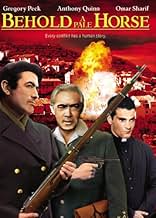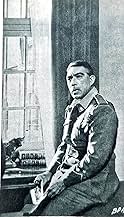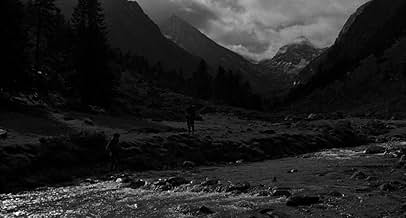NOTE IMDb
6,7/10
2,4 k
MA NOTE
Le célèbre bandit espagnol Artiguez retourne dans son village espagnol natal après 20 ans d'exil en France, mais le flic espagnol Vinolas lui tend un piège.Le célèbre bandit espagnol Artiguez retourne dans son village espagnol natal après 20 ans d'exil en France, mais le flic espagnol Vinolas lui tend un piège.Le célèbre bandit espagnol Artiguez retourne dans son village espagnol natal après 20 ans d'exil en France, mais le flic espagnol Vinolas lui tend un piège.
- Réalisation
- Scénario
- Casting principal
Marietto
- Paco Dages
- (as Marietto Angeletti)
Perrette Pradier
- Maria, Hussy
- (as Perette Pradier)
Avis à la une
Intelligent and magnificent film by the great director Fred Zinnemann . It deals with "Manuel Artíguez" (Gregory Peck), he is a popular "maqui" or partisan who after the Spanish Civil War, left the country such as hundreds of comrades to take refuge in France. Twenty years later, "Paco" , a 11 years kid , and son of his best friend passes the Spanish border to ask him for return to Spain and murder the Captain of the Civil Guard, "Viñolas" (Anthony Quinn), in revenge for the death of his father. Artíguez, a resident in the city of Pau is nowadays retired and ignores the request of the boy . But, "Pilar" (Mildred Dunnock) mother of "Artíguez" falls seriously ill, and "Viñolas" decides to prepare a trap that allows capture "Artíguez" . Although a good priest (Omar Sharif) advises Manuel that he's being double-crossed by Carlos (Raymond Pellegrin), Manuel determines to return at whatever cost.
Picture inspired by the novel "Killing a mouse on Sunday" by Emeric Pressbuguer in which the personages undergo a physical wage war and ideological battle in post-Spanish Civil War . At the beginning displays frames of the documentary "Morir en Madrid," with opening montage by courtesy by Frederic Rossif. The film was shot in Franstudio, Saint-Maurice, Val-de-Marne, France and Lourdes, Hautes-Pyrénées, France . There was built a Spanish street that followed once time was terminated the shooting . Pressburger's novel was loosely based on the last raid of real-life anarchist guerrilla Antonio Sabate who was murdered in an ambush in 1959.
This film is almost unknown since it was banned in Spain for its politics issues until subsequent exhibition in 1979. The movie was prohibited in Spain, which was still commanded by Generalissimo Francisco Franco (deceased in 1975), the victorious General of the Spanish Civil War . And it was scheduled to be telecast on a major American network, but was canceled at the last minute, allegedly at the behest of the Spanish government. Fortunately today we can enjoy this splendid masterpiece , a motion picture masterfully realized and played with a top-notch list of first players . The performers hand perfectly their respective characters . The "Manuel" role in his bitterness and deception is awesome , as well as the "Viñolas" in his toughness and rudeness . Furthermore , a large secondary cast formed by veterans as Mildred Dunnock and Paolo Stoppa ; and brief roles by Daniela Rocca ,Jose Luis Villalonga, Claude Berri , Michael Lonsdale, Christian Marquand and Rosalie Crutchley as the ill wife.
This is an interesting and thought-provoking thriller well produced by Alexander Trauner ( also production designer) and Zinnemann . It packs tension , high intrigue , political events and is slow-moving ; however is pretty entertaining . In spite of the fact that the runtime is overlong, is neither tiring , nor dull , but thrilling . The motion picture is stunningly directed by Fred Zinnemann who had a lot of experience from his former classic films as ¨High Noon, From here to eternity, Man for all seasons ¨, among them. Rating : Very Good , better than average. In spite of being such fine movie the picture had a minor success at the box office . Rating : Above average . Essential and indispensable watching , valiant try by all.
Picture inspired by the novel "Killing a mouse on Sunday" by Emeric Pressbuguer in which the personages undergo a physical wage war and ideological battle in post-Spanish Civil War . At the beginning displays frames of the documentary "Morir en Madrid," with opening montage by courtesy by Frederic Rossif. The film was shot in Franstudio, Saint-Maurice, Val-de-Marne, France and Lourdes, Hautes-Pyrénées, France . There was built a Spanish street that followed once time was terminated the shooting . Pressburger's novel was loosely based on the last raid of real-life anarchist guerrilla Antonio Sabate who was murdered in an ambush in 1959.
This film is almost unknown since it was banned in Spain for its politics issues until subsequent exhibition in 1979. The movie was prohibited in Spain, which was still commanded by Generalissimo Francisco Franco (deceased in 1975), the victorious General of the Spanish Civil War . And it was scheduled to be telecast on a major American network, but was canceled at the last minute, allegedly at the behest of the Spanish government. Fortunately today we can enjoy this splendid masterpiece , a motion picture masterfully realized and played with a top-notch list of first players . The performers hand perfectly their respective characters . The "Manuel" role in his bitterness and deception is awesome , as well as the "Viñolas" in his toughness and rudeness . Furthermore , a large secondary cast formed by veterans as Mildred Dunnock and Paolo Stoppa ; and brief roles by Daniela Rocca ,Jose Luis Villalonga, Claude Berri , Michael Lonsdale, Christian Marquand and Rosalie Crutchley as the ill wife.
This is an interesting and thought-provoking thriller well produced by Alexander Trauner ( also production designer) and Zinnemann . It packs tension , high intrigue , political events and is slow-moving ; however is pretty entertaining . In spite of the fact that the runtime is overlong, is neither tiring , nor dull , but thrilling . The motion picture is stunningly directed by Fred Zinnemann who had a lot of experience from his former classic films as ¨High Noon, From here to eternity, Man for all seasons ¨, among them. Rating : Very Good , better than average. In spite of being such fine movie the picture had a minor success at the box office . Rating : Above average . Essential and indispensable watching , valiant try by all.
This excellent film tells the story of a stubborn Spanish republican, Manuel Artiguez, who refused to give up the fight when his side lost the Spanish civil war to the fascists in 1938. The film takes place twenty years later, when after many successful raids, Artiguez has lost the will to continue. However, his adversary, a Spanish police chief called Vinolas, has not yet given up on capturing or killing him and sets a trap for him. The trap and the question of whether Artiguez will fall into it it will keep you on your seat for most of the movie. Three men caught between Artiguez and Vinolas, an informer, a priest, and an idealistic Spanish exile boy, add a rich psychological and moral dimension to the film, following themes of idealism, revenge, and the uses of violence.
"Behold" is a great thriller with highly complex characters and a profound moral sensibility. The idealism of Spanish republicans like the boy is on the one hand supported by the oily and hypocritical Vinolas, and on the other hand undercut by the rawness and violence of Artiguez. Neither of the adversaries is vindicated, but neither are they equivalent to one another. The ending will set you thinking for hours, if you're so inclined.
Performances by Peck (Artiguez) and Quinn (Vinolas) are great. Peck is less stuffy than usual. I'm not generally a fan of earnest, wet-eyed Sharif (the priest), but his performance here suits the movie quite well. I can still hear his voice saying "Did the informer escape? Is the bandit safe?"
My only complaint is that for all of its thematic complexity and richness of character the film is at times somewhat melodramatic and the dialogue is sometimes a little clunky. And for some reason its parts, good characters, good plot, good actors, all excellent, do not quite add up into a perfect whole. Nor is it as good as some of the movies it slightly resembles: Guns of Navarone, Battle of Algiers, Wild Bunch. However, it is definitely worthwhile for fans of 'thoughtful thrillers'.
"Behold" is a great thriller with highly complex characters and a profound moral sensibility. The idealism of Spanish republicans like the boy is on the one hand supported by the oily and hypocritical Vinolas, and on the other hand undercut by the rawness and violence of Artiguez. Neither of the adversaries is vindicated, but neither are they equivalent to one another. The ending will set you thinking for hours, if you're so inclined.
Performances by Peck (Artiguez) and Quinn (Vinolas) are great. Peck is less stuffy than usual. I'm not generally a fan of earnest, wet-eyed Sharif (the priest), but his performance here suits the movie quite well. I can still hear his voice saying "Did the informer escape? Is the bandit safe?"
My only complaint is that for all of its thematic complexity and richness of character the film is at times somewhat melodramatic and the dialogue is sometimes a little clunky. And for some reason its parts, good characters, good plot, good actors, all excellent, do not quite add up into a perfect whole. Nor is it as good as some of the movies it slightly resembles: Guns of Navarone, Battle of Algiers, Wild Bunch. However, it is definitely worthwhile for fans of 'thoughtful thrillers'.
This is a film which has almost faded into total obscurity, and that's tragic, because it's well worth seeing. It's sort of a thinking person's suspense movie, better appreciated if you know some details about the intricate historical background in which it is set. Even so, it can be appreciated for its dramatic settings and characterizations. It has a complicated plot, to be sure, but the story rolls right along...not a lot of action until the end, but the tension builds steadily. I'm no fan of Peck, but his role here really drew me in. He looks beaten down by a hard life and way too much unhealthy passion. Quinn doesn't have much screen time, but I liked some of the minor characters best...their faces were great. The credit sequence, meshed together perfectly with newsreels, shows a long line of defeated soldiers, their faces reflecting defeat and confusion... a great tracking scene.
Here are some reasons I think the film is unknown: 1. The main character is an atheist communist anti-catholic guerilla bandit. Not a popular icon in American movies. 2. Complex historical background. 3. Knowledge of political situation in Spain a minimum requirement. Not a priority on many American's lists. 4. Black and white photography in 1964. (Hey, I liked the scenery...but you always wonder how it would look in color...and this was a late date for a black and white feature film.) 5. Civil War movies (even Spain's) always run a risk...you might alienate half the audience.
Here are some reasons I think the film is unknown: 1. The main character is an atheist communist anti-catholic guerilla bandit. Not a popular icon in American movies. 2. Complex historical background. 3. Knowledge of political situation in Spain a minimum requirement. Not a priority on many American's lists. 4. Black and white photography in 1964. (Hey, I liked the scenery...but you always wonder how it would look in color...and this was a late date for a black and white feature film.) 5. Civil War movies (even Spain's) always run a risk...you might alienate half the audience.
I get surprise when see that only a few people see this film because I think that it is one of the best zinnemann film.The story which is about alone man that is far from of best years of his life and right now is desolate and subsist in very hard condition(spiritual)is so nice.Peck,Quinn and Sharif all are in their best. Scene that vinolas(Quinn)pray in church is unforgettable.
In 1939 like John Wayne's Ethan Edwards in The Searchers, Gregory Peck does not believe in surrenders. When all the others give up their weapons and go home, Peck conspicuously keeps his and keeps up the good fight. Of course twenty years later, Peck's become nothing more than a common bandit with the barest trappings of the revolutionary ardor he once had for the Republican cause in the Spanish Civil War.
His rival, his Pat Garrett to Peck being Billy the Kid, is the local captain of the Guardia Civil in Anthony Quinn. Peck's constant raids into his border area from France are a source of embarrassment to him and block his chances for advancement. At one time Quinn was a hardened Falangist, but now he's just a policeman.
Twenty years as made a lot of changes in both men. Quinn a devote Catholic who probably joined the fascist forces because of the anti-clerical attitudes of the Republican government now observes the form of religion, but he's got a mistress on the side. When he goes to pray it's not for anything profound, just please let him get Peck so he can advance.
Peck is as anti-clerical as he was during the Spanish Civil War in the late Thirties, but now is really into it a lot for violence's sake. He also knows his cause is long lost, but needs the excuse for what he's now doing. He also gets quite a surprise in finding a priest like Omar Sharif going to warn him about an informer in his crew. Catholics do come in all shapes and sizes.
Although Peck is somewhat miscast as a Spaniard, still he does a good job as does Quinn and Sharif. The strength of Behold a Pale Horse is that it presents both Peck and Quinn as flesh and blood people, neither of them all good or all evil from your point of view.
Behold a Pale Horse was made in 1964 and eleven years later Francisco Franco in whose service Quinn was in died after being dictator of Spain for 36 years. When I visited Spain in 2001 the thing that struck me was how there was very little evidence of Franco's reign. Spain has now settled quite nicely into a constitutional monarchy with a functioning parliament. And the Catholic church which rode as high in Spain as it did during Philip II is rapidly losing influence.
Kind of makes you wonder just what Peck and Quinn were fighting about.
His rival, his Pat Garrett to Peck being Billy the Kid, is the local captain of the Guardia Civil in Anthony Quinn. Peck's constant raids into his border area from France are a source of embarrassment to him and block his chances for advancement. At one time Quinn was a hardened Falangist, but now he's just a policeman.
Twenty years as made a lot of changes in both men. Quinn a devote Catholic who probably joined the fascist forces because of the anti-clerical attitudes of the Republican government now observes the form of religion, but he's got a mistress on the side. When he goes to pray it's not for anything profound, just please let him get Peck so he can advance.
Peck is as anti-clerical as he was during the Spanish Civil War in the late Thirties, but now is really into it a lot for violence's sake. He also knows his cause is long lost, but needs the excuse for what he's now doing. He also gets quite a surprise in finding a priest like Omar Sharif going to warn him about an informer in his crew. Catholics do come in all shapes and sizes.
Although Peck is somewhat miscast as a Spaniard, still he does a good job as does Quinn and Sharif. The strength of Behold a Pale Horse is that it presents both Peck and Quinn as flesh and blood people, neither of them all good or all evil from your point of view.
Behold a Pale Horse was made in 1964 and eleven years later Francisco Franco in whose service Quinn was in died after being dictator of Spain for 36 years. When I visited Spain in 2001 the thing that struck me was how there was very little evidence of Franco's reign. Spain has now settled quite nicely into a constitutional monarchy with a functioning parliament. And the Catholic church which rode as high in Spain as it did during Philip II is rapidly losing influence.
Kind of makes you wonder just what Peck and Quinn were fighting about.
Le saviez-vous
- AnecdotesThe movie was banned in Spain, which was still ruled by Generalisimo Francisco Franco, the fascist victor of the Spanish Civil War.
- GaffesIn the first 5 minutes of the movie it is supposed to be 1939 and the Loyalist (Republican) soldiers are crossing into exile on the French border. As they cross over they are turning in their guns and the first one to turn in his gun turns in a Soviet PPSh-41 sub-machine gun. The PPSh-41 was not developed until 1941.
- Crédits fousOpening credits - the first card shown contains the passage from Revelations 6:8, which contains the phrase "Behold a Pale Horse", the title of the film.
- ConnexionsFeatured in Hollywood contra Franco (2008)
Meilleurs choix
Connectez-vous pour évaluer et suivre la liste de favoris afin de recevoir des recommandations personnalisées
- How long is Behold a Pale Horse?Alimenté par Alexa
Détails
Box-office
- Budget
- 3 900 000 $US (estimé)
- Durée
- 2h 1min(121 min)
- Couleur
- Mixage
- Rapport de forme
- 1.85 : 1
Contribuer à cette page
Suggérer une modification ou ajouter du contenu manquant




































